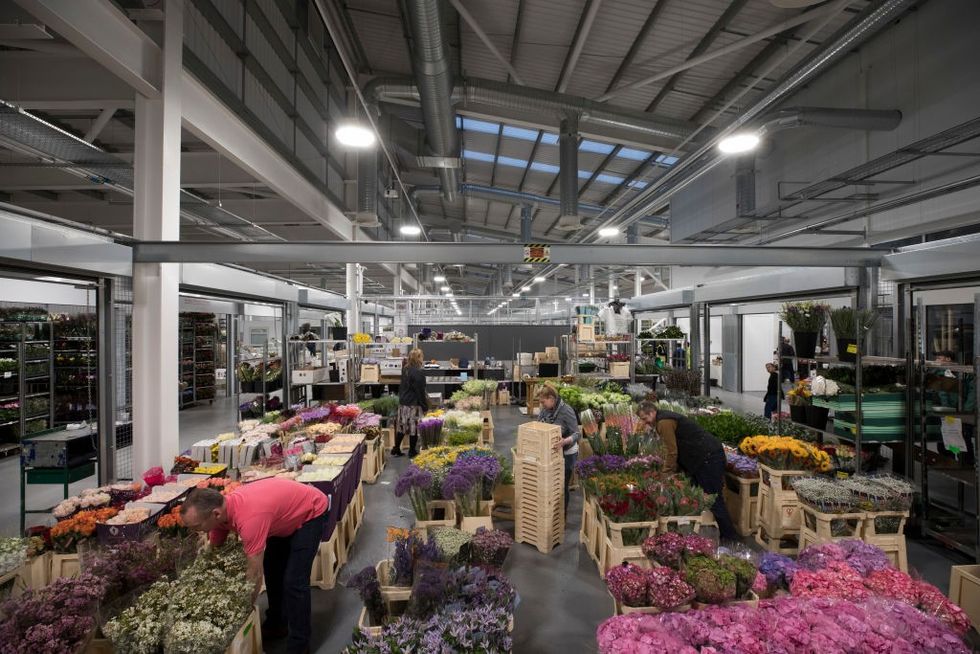By the time most Londoners had rolled out of bed on Monday morning, Gary Marshall was already winding down for the day at New Covent Garden Market.
Located on the south bank of the River Thames, surrounded by high-rise buildings glinting in the dawn of early winter, the wholesale market is the UK's largest for fruit, vegetables and flowers.
"It's London's best kept secret," Jo Breare, the market's general manager, told AFP on its 50th anniversary.
London's historic fruit and vegetable market in Covent Garden, moved from central London to the southwestern suburb of Battersea on November 11, 1974, in a bid to expand and modernise.
Marshall has been working at the market for over 45 of those years, alongside nearly 200 businesses supplying London's local grocers, restaurants, hotels and offices.
He is the third generation in his family associated with the market, and his son, George, will take over his business, Bevington Salads, after him.
"New Covent Garden is part of us. It will be part of my son's life, maybe part of my grandson's life," he said.
"Once you're in it, honestly, you're in it for life," said Marshall, who is also chairman of the New Covent Garden Tenants Association.
'Like magic'
The working "day" begins at around 10:00 pm in the evening (2200 GMT) for some 2,000 people who work at New Covent Garden, with produce arriving from all over Europe and the world.
"Once you get here at 10 o'clock, you have a cup of tea, you have a look at your produce arriving.
"And then it happens. Then the buzz is on. The market's alive," described Marshall, his eyes lit up with pride.
Traders sell their produce in "old school" fashion - face to face - through the early hours, then, as the sun rises, it is shipped out across the capital and southeast England.
"So, by the time people are getting out of bed and walking into their hotel or into their office or a school or a government building, it's there... It's like magic," said Marshall.
"If you're here at one, two or three in the morning, it's like a little city with hundreds and hundreds of people," said Wanda Goldwag, chair of the Covent Garden Market Authority, which manages New Covent Garden Market.

The sprawling complex even has its own cafes and a post office that runs from 3:00 am to 1:00 pm.
Overnight work hours, in place since a decade to remove daytime commercial traffic in the congested British capital, have made attracting younger generations tricky, according to Marshall.
But the market and its vendors have weathered many storms in the last half a century.
When demand slumped at the end of the 20th century as supermarkets grew, New Covent Garden turned its attention to the hospitality industry instead.
Relevance
The market still supplies Michelin star restaurants, celebrity chefs and upscale London landmarks such as retailer Harrods and the Claridge's hotel.
One loyal customer is French chef Pierre Koffmann, who used to frequent the market when he ran La Tante Claire, his three-Michelin star London restaurant.
"It was a pleasure to come here, to meet people who were different and talk about vegetables," Koffmann told AFP.
Now, he mainly comes down to buy flowers, from the bundles of pink-purple hydrangeas to crates of roses and tulips that the CGMA says supply 75 per cent of London's florists.
For Goldwag, remaining relevant is one of the main challenges.
"So, so many of us buy our food from supermarkets now. And of course, in tough economic times, everyone is very money conscious," she said.
"Wholesale markets have to make sure they stay relevant and sustainable."
London's other main wholesale markets, Smithfield meat market and Billingsgate fish market, face uncertain futures after plans to relocate them were put on hold.
"They could very soon be out of anywhere to work from," rued Marshall, adding that New Covent Garden would "support" the other markets.
At New Covent Garden, however, business is booming, with a turnover of £880 million last year, regeneration plans set to be completed before the end of the decade and a guaranteed lease for at least the next 25 years.
"I don't know if I'll still be here in 25 years," said Marshall. "But my son certainly will be."
(AFP)






